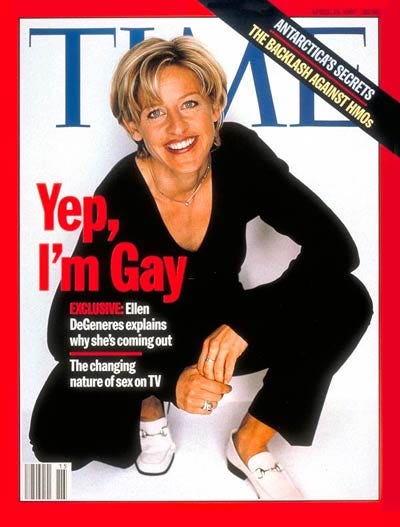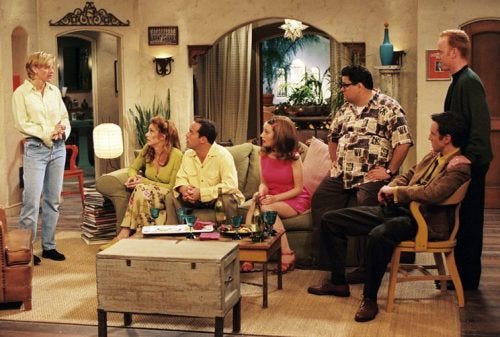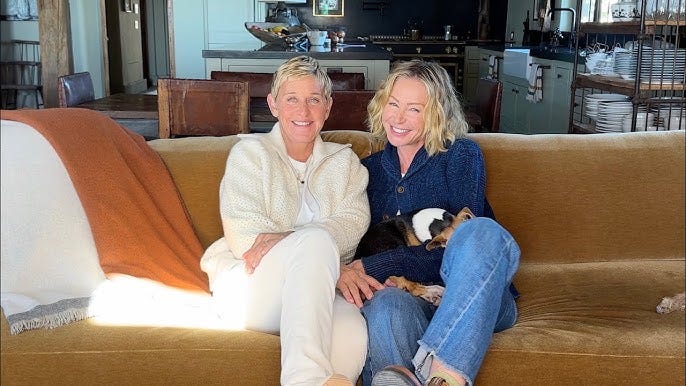Issue 14: Yep, Ellen's Gay
Ellen DeGeneres came out, the world lost its mind, and history was made.
April 30, 1997. It was the two-part episode that the nation had been waiting for. Ellen Morgan was about to come out. The ABC sitcom Ellen was a minor hit, nowhere near on the same level as Friends or Frasier but a respectable show about a bookstore owner navigating life in her 30s. It worked as intended, being a vehicle for its star, a stand-up comedian named Ellen DeGeneres. Influenced by her heroes Woody Allen and Steve Martin, the Louisiana native broke out in 1986 after an appearance on The Tonight Show, where she was famously invited to sit with Johnny Carson (the comedian equivalent of a knighthood.) She was a safe comic, a warm presence whose observational humour led some to call her the female Jerry Seinfeld. Like her character, she was also gay, and Ellen Morgan’s outing would coincide with Ellen DeGeneres’ decision to tell the world, “Yep, I’m gay.”
Time. "Roll Over, Ward Cleaver." April 14, 1997. Bruce Handy.
(Image via Time.com)
The Time magazine cover is iconic. It’s casual, folksy, and very Ellen, which makes it easy to forget just how damn daring it was. In 1997, Bill Clinton had already signed into law the Defense of Marriage Act, which banned federal recognition of same-sex marriage. Don't Ask, Don't Tell had been in force since 1994, keeping queer servicepeople in the military in an unwinnable situation where being out would lead to their dismissal. Queer rights have made great leaps and bounds, both politically and culturally, but the incremental increase of LGBTQ+ content in film and TV was endlessly boycotted and protested by the right wing. So, for Ellen DeGeneres to just say it like she was letting people know her coffee order? And in a national magazine that you could buy at the supermarket? It took guts. And it changed pop culture forever.
As the Time piece noted, everyone kinda already knew that DeGeneres was gay. "In every interview I ever did," she said, "everyone tried to trap me into saying I was gay." She would avoid the question or note that her personal life was not up for debate, which of course only further fuelled the fires. As this was ongoing, the team behind Ellen found themselves in a creative rut. The show had already undergone one major revamp, with a name and cast change from seasons one to two. But it still felt inessential, especially when compared to the relationship hijinks of Friends or the caustic wit of Seinfeld. By the end of the third season, producers felt that the show lacked direction. Even in this article, Time describes the show as "innocuous" and "intermittently funny." Ellen Morgan didn't have much interest in romance, which set it apart from sitcoms of the time where relationships were the narrative bedrock of the genre. Michael Eisner, the CEO of Disney, suggested that Ellen should get a puppy to liven things up. Yes, things were that dire. So, when it came time to negotiate for a fourth season, they brought the idea of making Ellen the first out sitcom lead on-air.
(Image via ABC.)
Word got out that Ellen(s) might be coming out, and things got very heated from there. GLAAD launched an Ellen Watch website and campaigned Disney to "let Ellen out." Pastors started organizing boycotts of ABC. The lot where the show was filmed had to be cleared after a bomb threat. DeGeneres was followed by car to the studio by a suspicious stranger. And the media speculated. Some thought it was all a publicity stunt to bolster ratings for a show nobody really loved. Time is sceptical but not overtly so. Their pragmatism actually feels pretty nuanced for the era, especially when they note that there will always be a conflict between altruism and profit. They noted:
"Does Ellen Morgan's coming out in what is still our massest medium legitimize homosexuality, or does the sponsorship of a bottom-line business like ABC merely reflect its acceptance by a significant portion of the population? Clearly, the answer is both, that TV and culture play off each other in ways that are hard to codify. Any attempt to reduce these complex reverberations to a black-or-white issue is, well, the kind of thing you'd expect from television."
It's a cynical stance but one rooted in reality, although I think it’s also far more optimistic about Ellen’s impact than many others were. As Time also includes in the article, the show was premiering these episodes (and DeGeneres’ own coming out) at a time when political attacks on mainstream entertainment were highly effective and a favoured tool of the loudest rabble-rousers. This was the decade where a sitting Vice President lambasted a fictional character, Murphy Brown, for choosing to have a child out of wedlock. Republicans spent much of the ‘90s attacking the National Endowment for the Arts for giving grants to stuff they considered frightfully gay, from Todd Haynes to Robert Mapplethorpe to performance artists. Gee, it’s almost like culture wars are never-ending and extremely easy to weaponize or something.
The Time piece has sidebars that draw attention to other controversial socially progressive moments in American TV, from Lucille Ball being pregnant on I Love Lucy but never actually being allowed to say the word “pregnant” to Maude choosing to have an abortion. The decade preceding this Ellen moment was viewed as a period of intense and much-needed change for pop culture, but in a way that felt very “one step forward, two steps back.” Spike Lee could change the game with Do the Right Thing, but Driving Miss Daisy would be the one to take home the Oscar. Sexy teen dramas like Beverly Hills 90210 could proudly revel in the salacious, but not without a wave of outrage from all the expected corners. The Time piece wonders if the decade is actually less daring than those that preceded it.
(Image via ABC. Remember pre-hair transplant Jeremy Piven?)
As one writer for The Drew Carey Show says, "Nobody's going to do abortion on a sitcom today, but Maude did it back in 1972. Abortion is way too hot a subject now." (Newt Gingrich's ears perked up at this moment, I'm sure.) "Stuff that shows like All in the Family Did – I don't think they'd let you get away with the kind of show with humor about racism, like the episode where Archie Bunker met Sammy Davis Jr. We've really gone backward in a way." This is echoed by Marta Kauffman, co-creator of Friends. “You couldn't do the masturbation episode of Seinfeld today."
When you get into the “you couldn’t do this stuff today” argument, you risk sliding into blurry nostalgia for a bygone age that never existed. Maude was heavily protested for that episode. All in the Family faced weekly battles with executives over what it could and couldn’t show, and it had to contend with a hell of a lot of racist jerks who thought Archie Bunker was the undisputed truth-telling hero of the series. I would say the ‘90s was great for some areas but that only exposed its limitations in others. Friends existed in a world where people of colour seemed to have vanished off the face of the Earth. Many gay side characters got married and had kids but were never the focus of the narrative. Most of the truly boundary-pushing stuff happened on cable, like HBO’s Oz. But shows didn’t have to do much to attract the ire of well-organised bigots. Ellen was as inoffensive a sitcom as ever existed, but the mere notion of its protagonist being gay was enough to inspire bomb threats. Dick Wolf admits in the piece that he wouldn’t take the risk with a move like this on his shows. Even if it was a shameless ratings stunt, it was one with a high cost that had no guarantee of success. And all for a show as sexless as church.
A lot of people were thoroughly Team Ellen. The two-part reveal, named “The Puppy Episode” in honour of Eisner’s comments, had an enviable slew of guest stars. Laura Dern played Susan, the woman who Ellen develops a crush on. Gay icons like k.d. lang, Melissa Etheridge, and Jenny Shimizu popped up, as did Demi Moore, Gina Gershon, and Billy Bob Thornton. Ellen's therapist was played by Oprah Winfrey, perhaps the greatest endorsement from the world of TV that this episode was good, actually. The end result is a very funny pair of episodes. It all seems to quaint now, with its sight gags and Ellen coming out of an actual closet, but it also gives the show the verve that it was lacking for so long. It feels like they found their purpose.
(Remember Coach?)
In the lead-up to the episodes, DeGeneres started to drop hints that she too was ready to leave the closet. She hung out with lang and kissed her while presenting her with an award at an event (go get it, Ellen.) Following both the Time cover and episode premieres, Ellen went public with her then-girlfriend Anne Heche (I wrote about how she was treated in a previous issue.) She joined Oprah on her show to talk about being out and had to deal with the audience treating her like she was introducing hardcore 69-ing to young kids on primetime TV. That was a recurring insult directed towards her, and a continuing line of harassment that LGBTQ+ people face: the idea that our existences are inherently sexual and predatory, and that we should be kept out of sight in case we influence little children to become deviants like us. Reading the side-bar of opinions on Ellen in this Time piece, which includes homophobic losers and exhausting contrarians like Camille Paglia, I couldn’t help but think of how trans people are the current punching bag of choice in the so-called culture wars, taking swipes from all sides of the political debate for merely existing. I’d like to say that some things are different now, but our right to exist in peace is still considered an acceptable topic of discourse.
For DeGeneres, coming out, both on and off-air, is freeing. The closet is smothering, even when it's made of glass, and dealing with it in the public eye is a unique catch-22 situation. There's a safety in not officially being out but also not enough of it to make it worthwhile. Speculation over DeGeneres' private life was seen as fair game for every journalist and critic. Then add to that the pressure of being the only one on network TV, the face of an entire movement who didn’t elect you to President of Gay, a job you never asked for. "I was thinking," she tells Time, "what's the thing anyone could ask me now or say about me? And it's like nothing, really. I mean, not even Howard Stern can hurt me now."
It didn’t quite work out that way, sadly. “The Puppy Episode” was the highest-rated episode ever of Ellen, drawing some 42 million viewers. It won an Emmy, a Peabody Award, a GLAAD Media Award, and was ranked at number 46 on TV Guide's list of the 100 Greatest Episodes of All-Time. In the UK, the episode aired on Channel 4, which was known as a more queer-friendly network, and Graham Norton himself flew DeGeneres to London to host a party for her. The show was renewed for a fifth season, but ABC treated the show like it was toxic. They prefaced each episode with a parental advisory warning, despite there being nothing more adult in the show than the mere existence of a gay woman. The press began to claim that the show and DeGeneres herself were "too gay." Having each episode deal with a "gay issue" was too far, apparently. Ratings declined and Ellen was cancelled after its fifth season. DeGeneres struggled to get work outside of stand-up for several years. It wasn't until the one-two-three punch of hosting the Emmys after 9/11, voicing Dory in Finding Nemo, and landing her talk show that she got back on top (and became bigger than ever.) She married Portia De Rossi, won more Emmys than anyone else on daytime, and became exceedingly wealthy. Truly, she won.
(Image via YouTube. I love Portia. Unretire from acting, please!)
The Ellen of 2024 is obviously a very different beast. She’s wildly rich and famous, the former host of one of the most successful daytime talk shows ever created, and arguably the most famous lesbian alive (at least until Chappell Roan’s worldwide takeover is complete.) But that legacy will forever have an asterisk next to it, a perennial reminder that her reign as queen of daytime optimism ended with a whimper following very serious allegations of workplace misconduct by her executives. By that point in time, it was also increasingly tough to ignore the narrative that Ellen was mean. The nicest woman on TV was not-so-secretly cruel, so said many people for many years. being an a-hole in Hollywood is the rule and not the exception, but it’s tougher to excuse it when your entire image is built upon being the dancing queen who your grandmother loves. Add to that the many business enterprises DeGeneres had built off the back of that ethos and things just seemed sourer than they used to be.
Recently, DeGeneres announced that she was retiring from the spotlight altogether. After her current stand-up tour (which has already cancelled a bunch of dates) and upcoming Netflix, she plans to get out of showbusiness. During a recent gig, she said, "I got kicked out of show business for being mean" (which seems like an understatement.) She insists she’s not actually mean, and that she’s getting out of Hollywood before they throw her out once more. When DeGeneres talks about get out of the spotlight and not have to deal with the endless dissections of her personality, I get it. Nobody can be the grinning jokester all the time, and we’re certainly more cognisant of the pressures of maintaining a relatable façade these days. But it is telling how little enthusiasm there seems to be about reembracing DeGeneres. She’ll always have her fans, but her absence isn’t as keenly felt as I’d imagined it would be. Kelly Clarkson, Jennifer Hudson, and Drew Barrymore did a more than ample job of filling the gap.
The children of Ellen live on. TV has made significant gains in terms of LGBTQ+ representation, and the diversification of pop culture across various platforms means that we’ve never been more spoiled for choice. But many of the same issues DeGeneres was forced to deal with in 1997 are still around 26 years later. Culture war bullsh*t is everywhere. Network and studio executives prize the bottom line over progress. A well-organized hate campaign can make a terrifying impact on something as mundane as a cartoon character. No matter how much progress we make, LGBTQ+ people will remain outsiders to a world that sees us as disposable and toxic. I’m not especially optimistic as a queer person about our media future, not when the Supreme Court seems primed to strike down equal marriage in America and my trash island has to deal with that wizard books lady’s nonsense on a daily basis. But I also don’t want to dismiss or undermine the work of those who came before us, those who had to take so many hits to do something as simple as say, “I’m gay” on primetime TV. The great work never ends, so take up the mantle and get on with it.
Thanks for reading. If you enjoyed this issue, I heartily recommend the work of video essayist Matt Baume, who does deep dives on American TV and pop culture and its portrayals of LGBTQ+ people. His video on Ellen is essential viewing. I also recommend Karina Longworth’s You Must Remember This, particularly her Erotic ‘90s season. The episode on Murphy Brown offers a more nuanced analysis of that Dan Quayle moment (spoiler: he was race-baiting.)
You can check out my work on Pajiba.com and a variety of sites. I wrote about Mia Goth’s scream queen status, why there will never be another Barbenheimer, and the rise of Ayo Edebiri. Primetimer is sadly no more (boo), but you can read my final piece for the site, on the 25th anniversary of SpongeBob SquarePants. I appeared on the Imaginary Worlds podcast to talk about the rise of romantasy fiction. For The Daily Beast, I wrote about TNT and Taylor Swift finally being part of a bona fide power couple. Stay tuned this coming week for more stuff, including a piece on Longlegs.
If you like my work and want to support me, you can donate to my Ko-Fi account!










Not being American, and therefore knowing pretty much nothing about the actors on all the sitcoms I watched (this being in the internet's toddler years) I had no idea Ellen was gay or that this episode was coming beforehand. But I remember thinking something was "off" with the few forced romance plots in the early seasons. The coming out made me go "oh yeaaaah - of course!". I also remember that the one having most difficulties coming to terms with the reveal was Ellen's female friend. Which was quite deftly handled.
I remember Coach too.